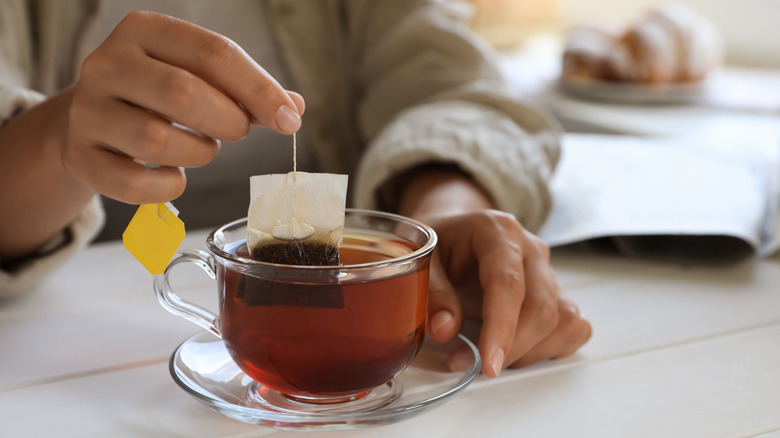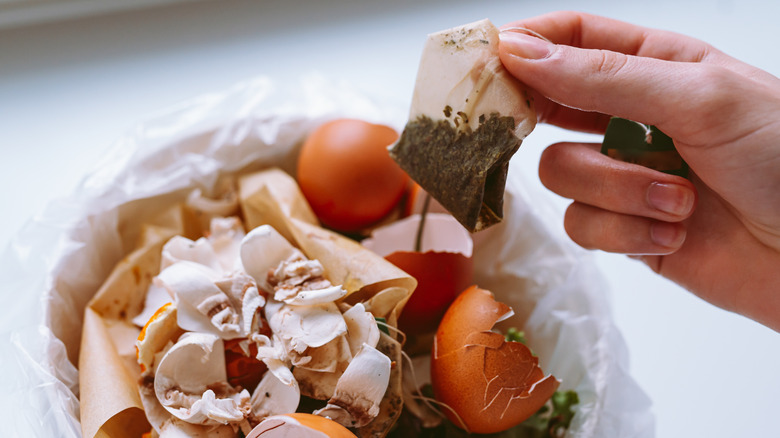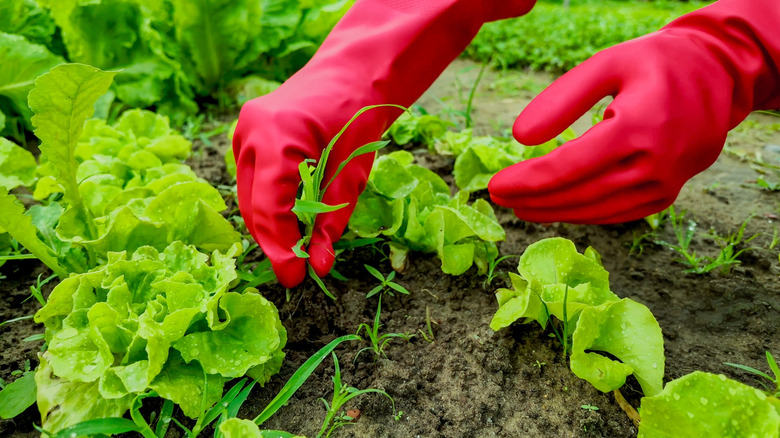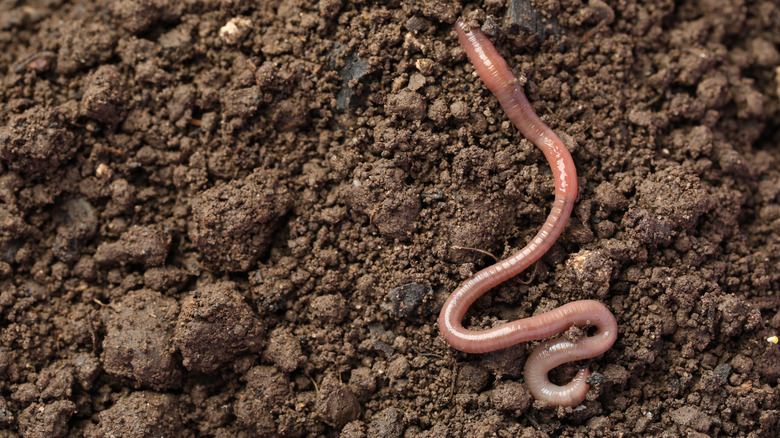Don't Toss Used Tea Bags When You Could Be Using Them In The Garden Instead
Nothing quite beats a hot cup of tea in the morning, but before you toss that soggy tea bag in the trash, know that you could repurpose it and put it to work in your garden. Tea has lots of amazing uses, with everything from adding amazing nutrients to your compost to even discouraging slugs or snails from munching on your leaves. They also might become your favorite recycled pods to germinate new seeds.
It's well known that tea offers great health benefits for people. It's rich in antioxidants and can supposedly supercharge your immune system and lower inflammation in the body. But did you know that tea could be healthy for your garden as well? Used tea bags can help fertilize that indoor houseplant or they canfeed worms in your soil or compost. They can even slow down the growth of invasive weeds. It's always a great day to repurpose
For now, you don't have to work that hard if you've got tea in your kitchen. If you love repurposing old items into thrifty DIY projects, then upcycling teabags might just become your new favorite hobby. Chamomile tea, black tea, and green tea bags can all be repurposed — whatever's your cup of, well, tea. Now, let's put those old tea bags to work!
Compost your tea bags
First, did you know you can compost most teas — tea bag and all? They can be a great addition to your compost, so you can put tea bags right in your composting container. Don't have one? Learn how to compost in a 5-gallon bucket. Tea bags contain nitrogen, which plants need to thrive. Many tea leaves also include potassium and phosphorus, which can help improve root health and encourage flowers to bloom.
For most tea bags, you can toss them in the compost pile (minus the staples) just as they are, but keep in mind that some tea bags out there are made with polypropylene, a plastic product that does not naturally break down. Polypropylene can help seal tea bags and makes them able to weather higher temperatures a bit better, but microplastics like these can contaminate your compost and cause plastic to leech into the soil. Keep in mind the tea leaves are the most nutrient-rich part, so the tea bags aren't nearly as important in making good compost.
Scan your tea labels before tossing those tea bags into your compost heap. Avoid polypropylene, polyester, or nylon, as these can all contaminate your compost. Look for tea bags that are made from all-natural materials like cotton or bamboo. If you're not sure, you can always cut the bag, and just add the loose leaf tea directly to your compost.
Use tea bags to germinate seeds
Tea bag compost isn't the only way to feed your garden. Used tea bags, especially the caffeine-free ones, can be a great way to germinate new seeds. And the best part is, once the plants germinate, you can plant them — tea bag and all — in a growing pot or directly into your flowerbeds.
To start, grab a used tea bag, and cut it open at the top or poke a hole in it. Tuck a seed or two inside and then either place the tea bag on a wet paper towel, or gently spray with water. Place the tea bag into a plastic bag to help ensure it doesn't dry out. Seeds can germinate just with tea leaves as long as they're kept moist and out of direct sunlight. Or if you prefer to germinate seeds in soil or compost, you can empty the bag of tea and then use the shell as a soil container.
Sprouts should appear in your tea bags probably within a week, though this depends on the type of seed used. Then, you'll be ready to transfer them into a small potted plant or directly into your garden. As long as the tea bag doesn't contain any microplastics and is biodegradable, you can plant the whole bag with the sprout straight into the pot or planter. Remember, caffeine-free tea bags are best for germinating seeds, because caffeine might slow growth for some young plants.
Use tea bags to stifle weed and fungus growth
Caffeine doesn't just blunt the growth of some seeds, it can also stunt weed growth in your garden. That means those used tea bags could also help slow down those fast-growing and unsightly weeds. One study from the Tokyo University of Agriculture and Technology found that some forms of Vietnamese green tea in particular slowed down the weeds. So if you're wondering: is green tea good for your plants? The short answer is yes.
In that study, researchers ground up tea leaves, let them sit in water, and then poured the tea on weed seeds to see how they fared. They found the weeds watered with green tea grew at a slower rate than those sprinkled with water alone.
But weeds aren't the only things tea can slow down. If you happen to have chamomile tea bags lying about, they can help stop the growth of fungus and treat damping off, too. Chamomile flowers contain sulfur, a natural fungicide. It's effective in preventing a fungal root infection by killing spores in the soil. You can use chamomile tea bags to make a compost treatment tea that you can either pour directly into the soil or spray on the plant itself. Soaking seeds in chamomile tea before planting might also discourage any rot.
Tea bags make fantastic worm food
Chamomile and other herbal teas have more uses, too. Worms might love the herbal treat as much as we do. Worms love munching on tea, and you can even use tea bags as a main ingredient if you decide to try your hand at vermicomposting, a type of composting where you let worms transform eggshells and other food waste into rich fertilizer for the garden. This means setting up a special composting container at worm-preferred temperatures between 59 and 77 degrees Fahrenheit and then adding a party of worms, usually red wigglers, to feast on your discarded food scraps.
Worms hate meat products, anything with vinegar like pickles or salad dressing, and most types of onions. If you're not yet open to the idea of creating your own worm farm, you can also bury your tea bags whole in your garden to leave as a surprise snack for your neighborhood garden worm. If you want to make a slightly easier meal for your earthworms, take the tea out of the bag first, though they can eat the bag if it's made of natural fibers.
There are many of types of garden worms, of course, that help keep the garden healthy. The holes they dig help water drain, and they keep soil healthy by spreading nutrients around. Keeping them well fed will help keep your soil healthy and your plants happy.
Use tea bags to fertilize your houseplants or repair your lawn
Another way to keep plants healthy is to add tea directly to your houseplants, flower beds, or even your lawn to perk up growth. Simply open the used tea bag, and sprinkle used tea leaves directly on your plants. When using tea as fertilizer, keep in mind it's also acidic, and might lower the soil pH, so it's best to use on flowering plants that like acidic soil, such as coneflower, gentian, and hydrangea.
Tea bags can help you grow grass as well, and repair bald patches in your lawn. Nitrogen in the tea can give a boost of nutrients to your lawn. Just bury a full tea bag with some grass seeds just below the topsoil, or use tea compost with the soil, and then watch the grass grow. Burying tea in the lawn might also help the soil retain water to help nourish grass roots, another added benefit.
Tea leaves might also repel some pests, such as snails and slugs. It can be another natural way to rid gardens of harmful parasites without using harsh chemicals. Caffeine in tea and coffee can be toxic to slugs and snails. Tea bags have so many uses, and they offer a quick and inexpensive way to boost growth in your garden. So after your next relaxing cup of tea, don't toss out the tea bags. Instead, repurpose them outside in your yard.



